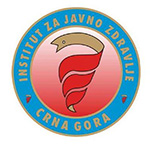Partners : IPH
 Institute for Public Health of Montenegro, Montenegro (IPH)
Institute for Public Health of Montenegro, Montenegro (IPH)
Džona Džeksona bb, 81000 Podgorica.
year of establishment – 1922
Institute of Public Health is licensed scientific-research institution.
Human capacities relevant to Project: 11 epidemiologists, MD (2 PhD), 10 microbiologists, MD (3 PhD), 1 biologist, specialist of biology of microorganisms (PhD)
There are six canters in the Institute of Public Health: Centre for Science, Centre for Health Promotion, Centre for Disease Control and Prevention, Centre for Development of Health Care System; Centre for Medical Microbiology, Centre for Hygiene and Health Ecology.
Institute possesses laboratories with adequate staff and equipment for performing all types of examination providing by domestic regulations in the field of environment protection, quality control of food, water andconsumer goods.
Institute of Public Health as a preventive-medical-health organization at tertiary level of health care system, covers: monitoring, researching and studying of population health and health culture, influence of environment on protection of population health, causes, spreading and prevention of infectious diseases, factors of risk of chronic non- infectious diseases and other diseases of high social-medical significance as well as organization, working and development of health service and proposing and caring out appropriate measures for prevention and improvement of population health . Among other tasks, IPH deals with healthy lifestyles, quality of nutrition and nutrition habits, analyzing of health quality of foods, consumer goods and drinking water. IPH monitors, analyses and evaluates influence of environment (air, soil and noise) on population health.
Main tasks they have been attributed and previous experience relevant to those tasks.
- prevention and control of communicable/vector-borne diseases
- Microbiological diagnostics (Leischmaniasis, West Nile feaver, Lyme disease, Malaria)
